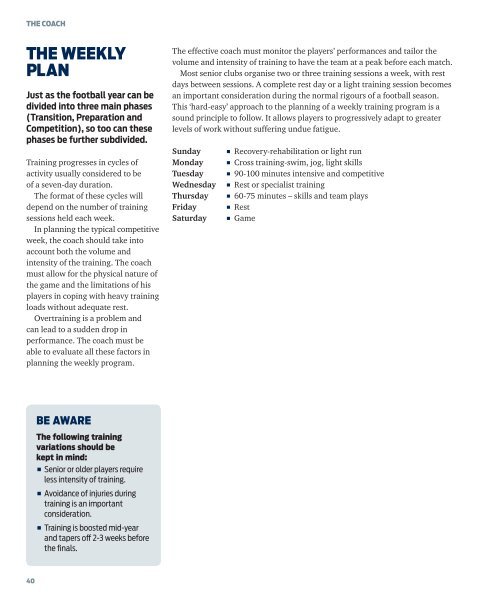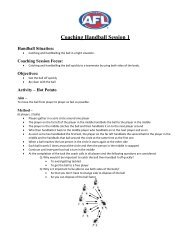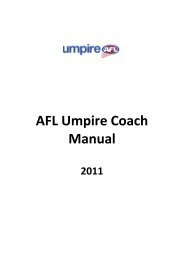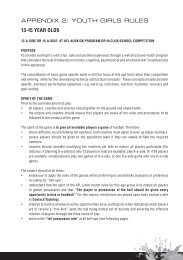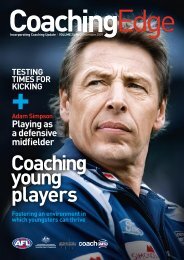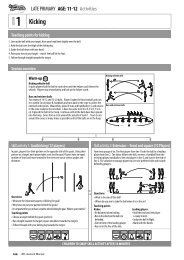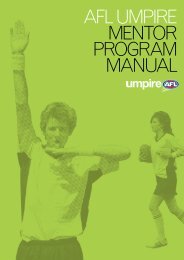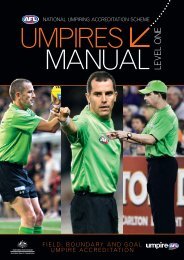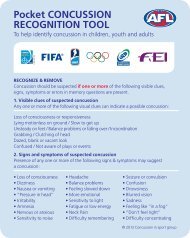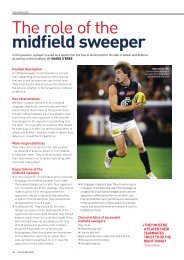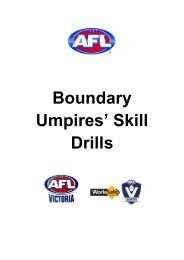AFL Coaching Manual - Western Bulldogs Football Club
AFL Coaching Manual - Western Bulldogs Football Club
AFL Coaching Manual - Western Bulldogs Football Club
Create successful ePaper yourself
Turn your PDF publications into a flip-book with our unique Google optimized e-Paper software.
the coach<br />
chapter 3 – planning<br />
THE WEEKLY<br />
PLAN<br />
Just as the football year can be<br />
divided into three main phases<br />
(Transition, Preparation and<br />
Competition), so too can these<br />
phases be further subdivided.<br />
Training progresses in cycles of<br />
activity usually considered to be<br />
of a seven-day duration.<br />
The format of these cycles will<br />
depend on the number of training<br />
sessions held each week.<br />
In planning the typical competitive<br />
week, the coach should take into<br />
account both the volume and<br />
intensity of the training. The coach<br />
must allow for the physical nature of<br />
the game and the limitations of his<br />
players in coping with heavy training<br />
loads without adequate rest.<br />
Overtraining is a problem and<br />
can lead to a sudden drop in<br />
performance. The coach must be<br />
able to evaluate all these factors in<br />
planning the weekly program.<br />
BE AWARE<br />
The following training<br />
variations should be<br />
kept in mind:<br />
pp<br />
Senior or older players require<br />
less intensity of training.<br />
pp<br />
Avoidance of injuries during<br />
training is an important<br />
consideration.<br />
pp<br />
Training is boosted mid-year<br />
and tapers off 2-3 weeks before<br />
the finals.<br />
The effective coach must monitor the players’ performances and tailor the<br />
volume and intensity of training to have the team at a peak before each match.<br />
Most senior clubs organise two or three training sessions a week, with rest<br />
days between sessions. A complete rest day or a light training session becomes<br />
an important consideration during the normal rigours of a football season.<br />
This ‘hard-easy’ approach to the planning of a weekly training program is a<br />
sound principle to follow. It allows players to progressively adapt to greater<br />
levels of work without suffering undue fatigue.<br />
Sunday<br />
Monday<br />
Tuesday<br />
Wednesday<br />
Thursday<br />
Friday<br />
Saturday<br />
Recovery-rehabilitation or light run<br />
Cross training-swim, jog, light skills<br />
90-100 minutes intensive and competitive<br />
Rest or specialist training<br />
60-75 minutes – skills and team plays<br />
Rest<br />
Game<br />
TRAINING<br />
SESSION<br />
The training session is<br />
the basic building block<br />
of coaching.<br />
At training, football skills are<br />
learned, conditioning and fitness<br />
levels are achieved and team<br />
confidence is developed.<br />
In football, the training session,<br />
will contain various drills<br />
set between a warm-up at the<br />
beginning and a cool down at<br />
the end.<br />
To decide on what drills are<br />
suitable for a particular session,<br />
the coach must first evaluate the<br />
team performance and then plan for<br />
optimal practice time.<br />
Goals should be established before<br />
each segment of a training session.<br />
This will ensure individual and team<br />
deficiencies and strengths will be<br />
focused on.<br />
Players should be educated to<br />
analyse their own performance<br />
and set personal goals for training<br />
so that they attend training with a<br />
purpose in mind.<br />
When planning a training session, the following considerations should<br />
be noted:<br />
1. Venue<br />
Various venues can be used during the football year, particularly in the<br />
pre-season period. In addition to their home ground, coaches should seek<br />
alternative venues ranging from an athletics track or swimming pool,<br />
to a well-grassed hilly surface, indoor gymnasium or basketball court.<br />
If carefully selected, these venues can greatly improve the general<br />
standard of training.<br />
2. Equipment<br />
The well-prepared coach will have a variety of equipment on hand<br />
at training.<br />
This can include:<br />
pp<strong>Football</strong>s, pump<br />
ppCones, witches hats<br />
ppWhistle, stop watch<br />
ppHandball target<br />
ppTackle bags, ruck bags<br />
ppPortable goal posts<br />
ppTraining jumpers and an adequate supply of water for players<br />
during and after training<br />
3. Outline of the training session<br />
Many coaches now provide the players with an outline of the training<br />
session before training. Players can be informed on the overall aims of the<br />
session in addition to the approximate length and intensity of the practice.<br />
4. Be specific<br />
Training must be specific to the demands of the game. With running<br />
training, the distance covered, the intensity of the running and the number<br />
of repetitions must be appropriate to the match and the various playing<br />
positions.<br />
It is essential that running work be supplemented with activities using<br />
footballs. This is particularly important during mid-season when the<br />
amount of daylight is limited.<br />
The game demands that decision-making skills and implementation<br />
of the style of play and team-plan be part of the training program.<br />
The effective coach will incorporate these components with the idea<br />
of practise as you play and play as you practise, highlighting the importance<br />
of specificity within the training session.<br />
5. Quality not quantity<br />
In general terms, the emphasis should be on a quality non-stop training<br />
session rather than one of low volume and long duration.<br />
40<br />
41


